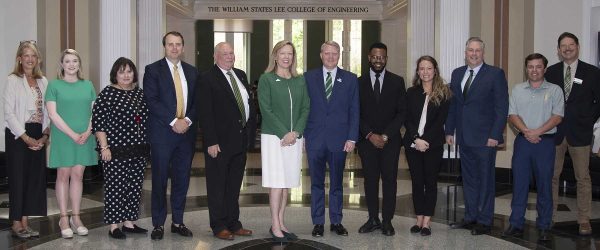University research showcased for inaugural Congressional Staff Symposium

Key staff members from offices representing North Carolina’s federal Senate and House of Representatives visited UNC Charlotte for a Congressional Staff Symposium, “Shaping What’s Next at an Emerging Research University,” on April 25 to learn about the University’s rapidly rising research profile. While on campus, the group met with several researchers and students whose work represents areas of research excellence and aligns with the growing needs of industries that are making substantial economic impact across North Carolina and the nation.
“Research drives the economy — and UNC Charlotte strives to provide that engine through its responsiveness to the needs of industry and the government. We are committed to providing innovation, entrepreneurship, and talent to fuel the economic growth of the entire Southeast region,” said Chancellor Sharon L. Gaber. “Maintaining awareness of our research capabilities, regional impact, and the depth of our university-industry-government partnerships among those who represent our state in Congress is critical as we work to become a globally recognized top-tier emerging research institution.”
In addition to a campus wide tour, the day — hosted by the Office of Research and Economic Development and the Office of Constituent Relations — included stops to explore research in progress, in particular projects funded by federal agencies such as the National Science Foundation, U.S. Department of Energy and the National Security Agency.
- At the Albert & Freeman Energy Production and Infrastructure Center (EPIC), Michael Mazzola, EPIC’s executive director; Ehab Shoubaki, the smart grid’s laboratory manager; and Abdullah Al Mamun, Ph.D. candidate in electrical and computer engineering, outlined work taking place in the Duke Energy Smart Grid Laboratory related to mitigating the effects of mass power outages due to natural disasters and cybersecurity attacks.
- At EPIC’s High Bay Laboratory, the group heard from John Daniels, professor and chair of civil engineering